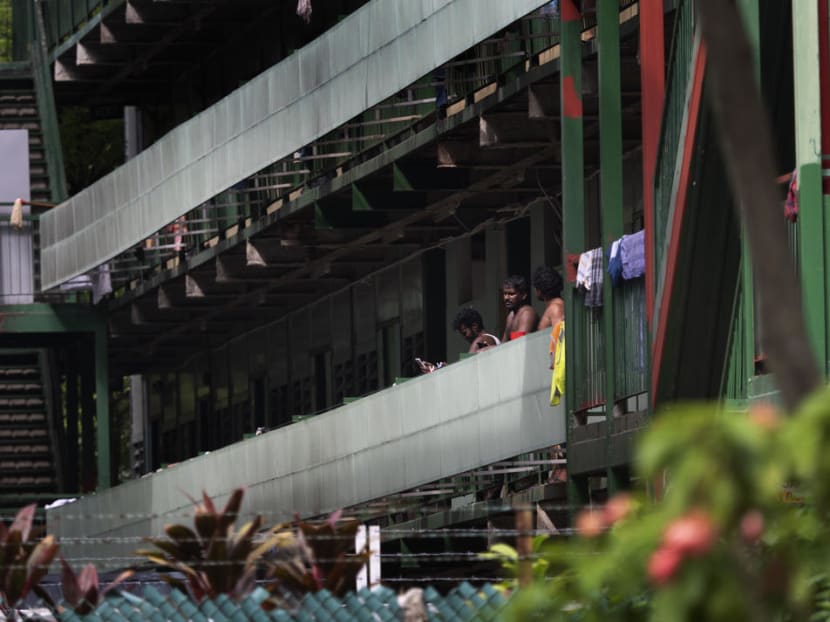Wastewater surveillance programme underway to determine transmission level of Covid-19 in S'pore
SINGAPORE — A pilot surveillance programme which screens wastewater samples to determine the level of community transmission of Covid-19 in Singapore is underway.

A pilot surveillance programme by authorities only detected viral material in the wastewater samples towards the end of March when there was a spike in cases reported in the dormitories.
SINGAPORE — A pilot surveillance programme which screens wastewater samples to determine the level of community transmission of Covid-19 in Singapore is underway.
While further research is being done, the initial pilot study measured the amount of viral material in wastewater taken from water reclamation plants and the manholes at 20 large migrant worker dormitories, said the National Environment Agency (NEA) in a joint statement with the Public Utilities Board (PUB) and the Home Team Science and Technology Agency (HTX) on Friday (June 19).
The tests only detected viral material in the wastewater samples towards the end of March when there was a spike in cases reported in the dormitories.
On the other hand, no viral material was detected on March 9, when there were fewer than 200 Covid-19 cases reported nationwide.
The agencies said the pilot results show that the concentration of viral material in wastewater is related to the prevalence of Covid-19 in the dormitories.
This information was then used to complement the authorities’ efforts in curbing the spread of the infection in the dormitories, said the statement.
The surveillance programme was first announced by National Development Minister Lawrence Wong during his televised ministerial broadcast earlier this week when he said that the authorities were extracting wastewater from manholes to test for Covid-19.
“The team has thus far demonstrated the utility of wastewater testing as a warning system for the presence of Covid-19 cases and that the trending of Sars-Cov-2 (the virus that causes Covid-19 in humans) concentration over time can determine if infection control measures have been effective,” said the agencies.
The trial tests also show that the screening programme can help to gather information on a cross-section of the community, which allows for the authorities to monitor large groups for infection.
“If positive signals are detected from wastewater at a particular site, clinical testing for Covid-19 can be carried out for the affected community, allowing screening for Covid-19 to be carried out in a more targeted manner.”
For example, during the pilot study, a zero reading for the coronavirus after testing samples near dormitories provided “added assurance” that the dormitories where no Covid-19 cases were detected were indeed free from infection.
On the other hand, for dormitories where viral material was detected in the wastewater, the authorities used the information to step up its testing regime by increasing the number of swab tests conducted for the workers residing in the affected dormitories.
This led to more detection and isolation of cases, including asymptomatic ones, said the authorities, and facilitated a more targeted swabbing strategy which helped to mitigate further transmission of the disease.
The NEA is now working to ramp up its capacity to increase the surveillance coverage by sampling more wastewater nodes.
In the joint statement, the agencies, however, cautioned that more research is needed to understand the sensitivity of the screening method in detecting early cases or communities where there are few cases.
For now, the study suggests that at low level transmission, the wastewater surveillance method appears to be less sensitive than clinical surveillance cases in Singapore.
“This is likely due to our intensive clinical testing regime. Monitoring is ongoing to determine the trending of the concentration of viral material at the water reclamation plants and the relationship between the viral material concentration and prevalence of Covid-19 in Singapore,” said Associate Professor Ng Lee Ching, director of NEA’s Environmental Health Institute.
The agencies also said that the detection of viral material in wastewater does not suggest the presence of infectious virus in the water sources.
The virus will not be able to propagate over time in wastewater without a host, they said.
Still, as an added precaution, wastewater from locations with Covid-19 cases — such as hospitals, isolation facilities and dormitories — are disinfected with chlorine at the premises before being discharged into public sewers.
More information on the results of the surveillance programme will be revealed in due course, said the agencies.











